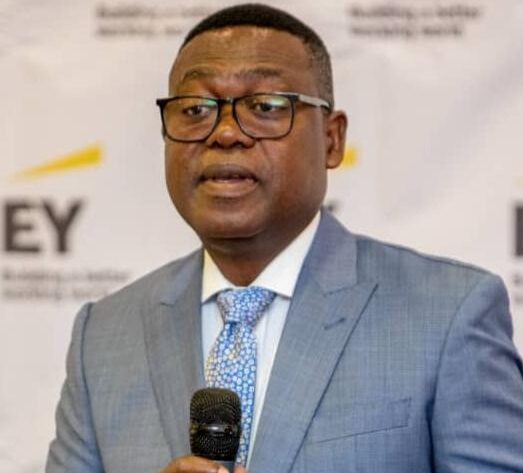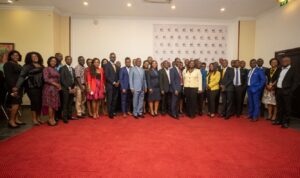Green bonds have been a fast-growing market for years; however, recently the issuance of green bonds has skyrocketed. According to forecasts collated by Environmental Finance, Green bond issuance is expected to be US$790billion in 2022 – jumping about 50% from US$534billion in 2021.
Also, COP26 published Climate Finance Delivery Plan provides a clear roadmap for developed countries to deliver on the US$100billion per year goal to support developing economies to meet their climate action commitments.
This presents huge opportunities for banks and businesses in Ghana and other developing economies. How can the Ghanaian corporate environment leverage these opportunities to enhance the country’s resilience and support its development trajectory?
EY Ghana organised an Environmental, Social and Governance (ESG) event to foster understanding of the rapid changes in ESG regulation, and showcase the ability of its Climate Change and Sustainability Services (CCaSS) unit to support businesses with ESG services and define a path to a more sustainable future for Ghana’s corporate environment.
EY has been named a leader for ESG services and sustainability consulting services by independent research firm Verdantix in its 2022 report. Building upon decades of sustainability leadership at global, regional and local level, EY’s CCaSS unit in Ghana has the resources, skills, experience and influence to help build a stronger and more sustainable business for the benefit of all.
“Taking steps to understand and appropriately respond to global ESG issues is imperative. Thus, this ESG event is essential, considering the scale of the challenges before us (the increasing severity of weather patterns, inequality within and between nations, human rights issues, bribery and corruption, etc.), to ensure a sustainable and inclusive recovery from the COVID-19 pandemic and protect the environment as the climate crisis deepens,’’ says Ferdinand Gunn, EY Country Leader-Ghana.
“I am certain that the outcome of this event will foster the need for businesses to adopt ESG best practices and enhance reporting on ESG metrics. This serves as a timely opportunity for sharing critical knowledge and information with a view to enhancing environmental, social and governance principles.’’
The ESG event enhanced understanding of ESG regulations and their effect on the Ghanaian corporate environment; called for increased collaborative efforts toward fostering climate action and Ghana’s sustainable development; deepened insights on the dynamics, risks, gains and opportunities in ESG regulation and reporting for stakeholders; as well as developed the capacity of businesses to integrate sustainability practices into business activities and strategic decision-making.
Mr. Ismail Adam, Deputy Director, Banking Supervision Department-Bank of Ghana, stated in his Keynote address that: “Incorporating ESG into an institution’s business makes it possible to attract more capital, green finance and investments’”. Better ESG risk management can help companies’ lower costs and attract more investments. Incorporating ESG into a business therefore helps to maintain and heighten the business’s reputation to its stakeholders, employees and potential investors. He further hinted that those stakeholders often use ESG engagement information to form their opinions of a company. This has a positive impact on the company’s outlook.
The event further highlighted the increase in global ESG regulations as well as funding opportunities that are available for businesses in developing countries which can demonstrate better ESG risk management, as well as disclose their ESG impact in a transparent manner.
In his context-setting address, Mr. Samuel Agbevem, Partner, CCaSS West Africa Leader indicated that: “There is rising pressure on corporate boards and government leaders to demonstrate that they are adequately equipped to understand and oversee ESG issues – from climate change to equal opportunities to human rights to social unrest.
And although many businesses set sustainability goals and publish ESG or sustainability-related data, these efforts have not translated to big wins; neither have most companies been able to access the large available pool of ESG funds or formed new partnerships based on their ESG efforts. This is because investors, regulators and the broader public are beginning to exercise greater scrutiny of corporate sustainability efforts”.
A panel made up of Mr. Paul Ababio – Deputy Director-General (Finance) of the Securities and Exchange Commission (SEC); Mr. Kwaku Boateng – Director of Local Content, Petroleum Commission; and Mr. Shaibu Haruna, Chief Sales and Distribution Officer of MTN, shared their perspectives on how companies in Ghana can embed ESG, create awareness and build capacity. Education, self-governance, aligning business strategy with ESG requirements, and being intentional about its implementation were some of the thoughts espoused by the panellists.
The event ended with calls for increased collaboration and value-focused partnerships to drive ESG integration and regulatory compliance.











